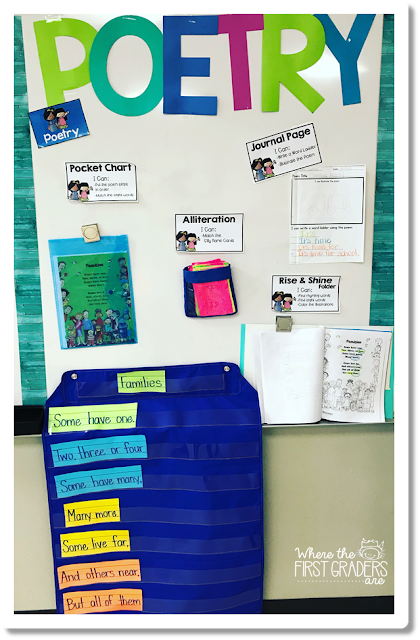
As a new teacher, I did not realize how important poetry actually is to reading fluency. To me it wasn't worth spending a lot of time on because poems are short and most of the time, students just memorize them anyway, they aren't actually reading them. I now know that the very reason I did not want to use them was the reason that they are so effective. Yes students often memorize them, but that allows them to focus on their speed, the intonation and the rhythm. I saw a HUGE difference in how my students were able to read with expression after a couple of months using this poetry station.
Pocket Chart/Poetry Packets
- a copy of the poem with highlighted sight words and circled rhyming words
- a copy of the poem on sentence strips
- separate high frequency words that can be matched to the sentence strips
- read the poem by themselves
- read the poem with a partner
- sequence the poem using the sentence strips
- match the high frequency words to the sentence strips
- use the printed poem to find high frequency words and rhyming words on their own copy of their poem that is in their desk
- respond to the poem in a poetry response folder (explained later)
Alliteration
Journal Page
Our poetry response folders are something that I started this past year. We were doing the same activities in a regular journal, but I found that my students did much better when they had a little bit more structure to follow. I chose to have my students focus on two kinds of responses to their poems.
Word Ladder
The first thing my students had to do was to choose their favorite line from the poem and create a word ladder. A word ladder is so great because it really works on reading fluency. Then, students illustrate that line. The kids love it because they see it as a time to draw and color. What they don't realize is that they are actually communicating what they visualize when they read the poem. Since they are only responding to one line of the poem, they can generate 5-6 or more responses to each poem so I never have to change anything in the station, yet they still have a TON of options to choose from.
FREE Poetry Journal Page
Saving Our Spot
So what if a student starts a response, but doesn't finish it during the ten minutes they are given for the poetry station? We use post-it notes to mark our spots if we are not finished. The students have to write their name and stick it at the top of the page. They know that before they start a new journal response, they have to check the sticky notes for any unfinished work first.














